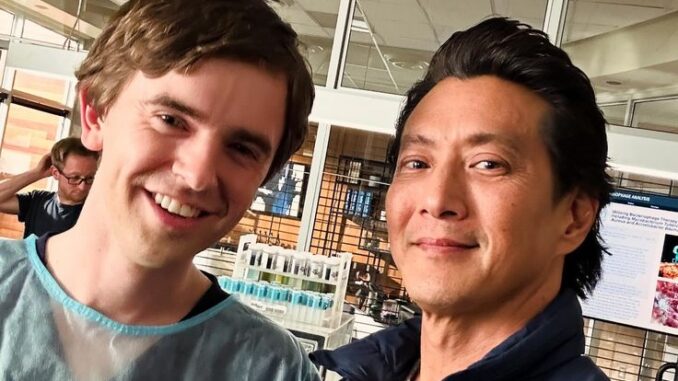
The Good Doctor, a medical drama that has captured audiences with its blend of emotional storytelling and complex character dynamics, reaches a pivotal moment in Season 4, Episode 8, titled “Parenting.” This episode introduces Lea Dilallo’s parents, Pam and Mike Dilallo, whose visit to meet Dr. Shaun Murphy, Lea’s autistic partner, adds a layer of personal tension to the series’ narrative. The roles of Pam and Mike are brought to life by seasoned actors Julie Warner and Barclay Hope, respectively. Their performances not only enrich the episode but also contribute to the show’s exploration of neurodiversity, familial relationships, and personal growth. This essay examines the actors who play Lea’s parents, their performances, and the significance of their characters within the context of The Good Doctor Season 4, offering insight into how their portrayals enhance the episode’s emotional and thematic depth.
Julie Warner, an accomplished actress with a career spanning film and television, takes on the role of Pam Dilallo, Lea’s mother. Warner is best known for her work in Doc Hollywood (1991) alongside Michael J. Fox and Tommy Boy (1995) with Chris Farley. Her television credits include a memorable stint as Megan O’Hara in Nip/Tuck and as Danni Lipton in Family Law. In “Parenting,” Warner portrays Pam as a protective yet judgmental mother, concerned about Lea’s relationship with Shaun due to his autism. Her performance is marked by a delicate balance of warmth and skepticism, capturing the complexity of a parent who loves her daughter but struggles to accept her choices.
During a pivotal dinner scene, Pam’s probing question about whether Shaun’s autism complicates his work as a surgeon feels intrusive, reflecting her unease. Warner delivers this moment with a restrained intensity, her facial expressions conveying both concern and hesitation. This authenticity makes Pam a relatable figure, embodying the real-world challenges families face when navigating differences. As the episode progresses, Warner’s portrayal evolves, particularly in the resolution where Pam softens after Shaun’s heartfelt defense of his relationship with Lea. Warner’s ability to transition from guarded to reflective adds depth to Pam’s arc, making her growth feel earned and impactful.

The introduction of Pam and Mike in “Parenting” serves as a catalyst for exploring Shaun and Lea’s relationship dynamics. Directed by Rachel Leiterman and written by Thomas L. Moran, the episode balances the personal stakes of their visit with Shaun’s professional challenges at St. Bonaventure Hospital, where he treats a teenage gymnast, Darya Denysenko. Pam and Mike’s arrival amplifies Lea’s anxiety, given their history of disapproving of her partners. Their interactions with Shaun, played with earnest vulnerability by Freddie Highmore, highlight societal misconceptions about autism, particularly in the uncomfortable dinner scene where their questions reveal their biases.
Warner and Hope’s chemistry with Highmore and Paige Spara (Lea) creates a dynamic that feels authentic, capturing the tension of a family meeting under strained circumstances. Shaun’s attempt to diffuse the awkwardness with a humorous anecdote about a patient’s hemorrhoid surgery elicits a laugh from Mike, a moment Hope plays with warmth, offering a glimpse of potential connection. However, the parents’ subsequent text to Lea, expressing doubts about her readiness for a “complicated” relationship, underscores their initial resistance. This sets the stage for Shaun’s pivotal confrontation, where his logical yet heartfelt speech prompts Pam and Mike to reassess their views. Warner and Hope’s performances in this scene, marked by quiet reflection and subtle remorse, elevate the episode’s emotional payoff, reinforcing its message of acceptance.
“Parenting” fits seamlessly into Season 4’s broader narrative, which navigates the challenges of the COVID-19 pandemic while deepening the personal arcs of its characters. The episode’s focus on family dynamics and neurodiversity aligns with the season’s themes of resilience and relationships. Pam and Mike’s storyline parallels the medical case of Darya, whose health suffers due to her parents’ intense expectations, creating a cohesive exploration of parenting’s impact. Warner and Hope’s performances amplify these themes, making their characters a lens through which to examine societal attitudes toward difference and the power of open dialogue.
The episode also reflects The Good Doctor’s commitment to addressing real-world issues. Mike’s vaccine comment, though misguided, mirrors persistent myths, and the show uses this moment to challenge such misconceptions through Shaun’s response. Warner and Hope’s ability to portray flawed yet redeemable characters ensures that this message resonates without feeling didactic, adding depth to the episode’s social commentary.
Despite their limited screen time, Julie Warner and Barclay Hope leave a lasting impression as Pam and Mike Dilallo. Their performances bring authenticity to the episode’s exploration of family, acceptance, and personal growth. Warner’s nuanced portrayal of Pam captures the protective instincts of a mother grappling with her daughter’s choices, while Hope’s depiction of Mike balances stubbornness with a capacity for change. Together, they create a believable family dynamic that challenges Shaun and Lea while ultimately reinforcing their bond.
